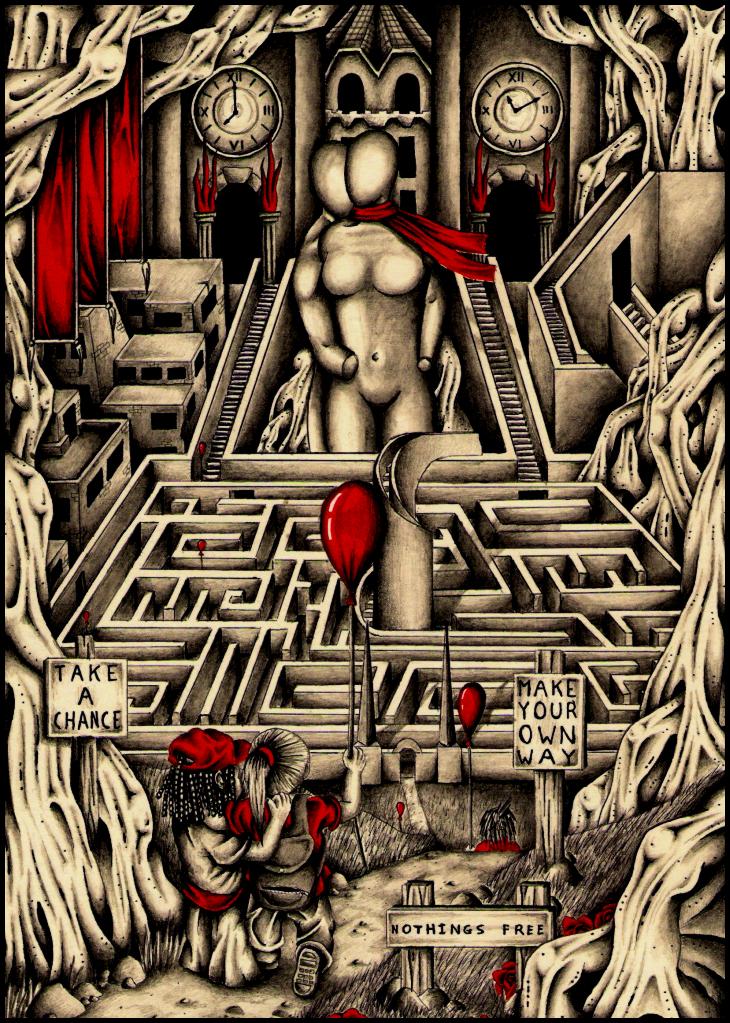Quote of the day:
"There are two ways to slide easily through life; to believe everything or to doubt everything. Both ways save us from thinking."
~
Alfred KorzybskiImage of the day:
 BODY
BODY~
Maximum Recruitment Training I -- "When anyone talks about training for any goal, they need to consider force, speed, and muscle fiber recruitment. They're the gears that are driving the bus, and Chad Waterbury is at the wheel. Remember, though, that the driver carries no change."
~
Muscle Mass Accretion Training: My Top 3 Mass-Building Tips! -- "In a nutshell, all fibers are involved in a set, but specific ones are emphasized for the duration... Learn more about these 3 tips and how they can help with muscle gain: Explosive pre-sets, Negatives, & Spot-Accretion."
This is advanced stuff.
~
Honey 'could counter the effects of ageing' -- "Honey could help counter the effects of ageing and decrease anxiety, according to a study. Scientists found a diet sweetened with honey improved memory and reduced anxiety."
~
How Much Protein Do You Need To Build Muscle? -- "You want to
build muscle? Make sure muscle recovery occurs faster than muscle breakdown. Give your body what it needs to build muscles. That’s why you must eat your proteins."
~
Personal Best : Sleep After Hard Workouts? You Must Be Dreaming -- "An exercise paradox: a walk wakes you up, but hard training will run you down."
A nap after a hard workout speeds recovery in my experience.
~
Stomach Virus a Culprit in Chronic Fatigue Syndrome -- "A father's concern for his son led to research that now sheds new light on a disease that has long been shrouded in mystery."
~
Rediscovering Protein - Corrective Action in the American Diet -- "Protein must be a part of a healthy diet for a simple reason: it is essential for life. Every single cell in the human body — including bones, blood, skin, chemicals, and enzymes — depend on protein for effective operation."
~
Aspartame manufacturer funds junk science that declares aspartame to be safe (opinion) -- "Ajinomoto, a top manufacturer of aspartame, has announced that aspartame is completely safe. This conclusion was reached by a panel of industry-friendly "experts" hired by Ajinomoto, who did no new research but, instead, selectively reviewed previous studies on the safety of aspartame (many of which were funded by aspartame manufacturers in the first place)."
This is an opinion piece, but it's good.
PSYCHE/SELF~
Sick? Lonely? Genes tell the tale -- "Lonely people are more likely to get sick and die young, and researchers said on Thursday they may have found out why -- their immune systems are haywire."
~
Agitation And Psychotic Symptoms Of Dementia Respond Well To Antidepressant Treatment -- "Researchers have found surprising evidence that an antidepressant (citalopram) may perform as well as a commonly-prescribed antipsychotic (risperidone) in the alleviation of severe agitation and psychotic symptoms of dementia. Researchers also found that the antidepressant was associated with "significantly lower" adverse side effects."
~
Paranoid Personality Disorder -- "The "paranoid" in PPD doesn't generally refer to a person with delusions or psychosis, but rather to someone who is constantly suspicious and distrustful of others."
~
10 Grateful Steps to Happiness -- "PsyBlog has gone gratitude-mad this week, what with reporting experimental evidence that
practicing gratitude can increase happiness by 25% and reviewing '
thanks' , the book by the study's author. To round it off here are Dr Robert Emmons' top 10 tips for actually becoming more grateful, and consequently more happy."
~
Moral Psychology and the Misunderstanding of Religion -- "
I just want to make one point, however, that should give contractualists pause: surveys have long shown that religious believers in the United States are happier, healthier, longer-lived, and more generous to charity and to each other than are secular people."
This article is from Edge #222.
~
Learned Hopelessness & Your Health -- "Learned helplessness and hopelessness are terms that have come into our vocabulary principally through the
research of
authentic happiness and learned optimism (click
here to test yourself on learned optism)
psychologist Martin Seligmann, who has been referred to here in this
blog in the past."
~
Dead End Therapy -- "You understand your problem perfectly. You know when it happens, how it happens, and you can have a pretty good stab at why it's happening. You even, theoretically, know what needs to change, for it to stop happening. But all this knowledge is absolutely useless to you when the problem arises. Nothing changes."
~
Body Image and Fear of Intimacy -- "Fear of intimacy is often exacerbated or made worse by a negative body image. Here's how to improve your body image and strengthen your relationships."
CULTURE/POLITICS~
Two good mythology sites:
Theoi Greek Mythology and
Encyclopedia Mythica.
~
Mike Miley: Smells Like Teen Spirit ... and Tater Tots -- "This past Labor Day weekend, L.A. radio station KROQ aired their Top 500 Songs of the 90s (twice), which meant that they played essentially 85% of their normal playlist. For a child who came of age in the 90s, however, this countdown was no ordinary countdown; this was a high school reunion, especially since I listened to music a whole lot more than I hung out with people during those years. It only took two or three songs for this broadcast to take the form of a Proustian madeleine, to the point that I was no longer sitting in traffic, I was sitting back in the cafeteria where my life changed."
~
WorkPlace: When the Rich Make Too Much: Is it Time for a Maximum Wage? -- "That "one solution," suggests
Howard Gardner, the Harvard-based psychologist whose widely acclaimed books on human intelligence have been translated into 26 languages, ought to be a cap on the income and wealth that any one individual can accumulate."
~
David Cronenberg's Eastern Promises reviewed -- "David Cronenberg's elegant treatise on the metaphysics of violence, begins with twin jets of blood: A man in a barber's chair has his throat cut by a mentally deficient would-be gangster, while elsewhere in London, a teenager in labor begs for help in a pharmacy, blood pouring from between her legs."
~
Ansen on the Toronto Film Festival -- "The movies in this year’s Toronto Film Festival were collectively like a wayback machine to the obsessions—and the memorable filmmaking—of the ’60s and ’70s."
~
What the President Means to Say... -- "Viewpoint: In his speech, Bush will endorse General Petraeus's plan for a small troop drawdown. But it's hard to escape the impression that we're just treading water in Iraq."
~
Politics: Failing Electoral College -- "Rob Richie | As California Republicans seek to game the dysfunctional Electoral College, a campaign is rising to establish a national popular vote."
HABITATS/TECHNOLOGY~
Researchers improve ability to write and store information on electronic devices -- "New research led by the U.S. Department of Energy's Argonne National Laboratory physicist Matthias Bode provides a more thorough understanding of new mechanisms, which makes it possible to switch a magnetic nanoparticle without any magnetic field and may enable computers to more accurately write and store information."
~
Kiva.org Crosses $11 Million in Microloans to Developing Nations -- "San Franciso-based
Kiva.org, a microfinance non-profit organization founded in 2005, is one of the best success stories of the charitable web. We first
profiled it back in January. In just 2 years, the site has funded nearly 17,000 loans to entrepreneurs in developing countries, and last week the total amount of those loans crossed the $11 million mark."
~
Judge hits auto makers, allows Vermont to limit emissions -- "In a blow to US automakers, a federal judge has ruled that the state of Vermont can set limits on car emissions believed to contribute to global warming, rejecting arguments that only the US government can regulate the industry."
~
188 More Species Deemed Near Extinction -- "Today the World Conservation Union (also known, for reason to arcane to go into, as the International Union for the Conservation of Nature and Natural Resources or IUCN) came out with its
"Red List" of species threatened with extinction. There are 188 additions to the list, bringing the total up to 16,306."
~
Salmon Spawn Baby Trout in Experiment -- "Papa salmon plus mama salmon equals ... baby trout? Japanese researchers put a new spin on surrogate parenting as they engineered one fish species to produce another, in a quest to preserve endangered fish."
~
Zebrafish to shed light on human mitochondrial diseases -- "Zebrafish can now be used to study COX deficiencies in humans, a discovery that gives scientists an unprecedented window to view the earliest stages of mitochondrial impairments that lead to potentially fatal metabolic disorders, according to researchers at the University of Oregon."
~
Oldest stars may shed light on dark matter -- "The universe`s earliest stars may hold clues to the nature of dark matter, the mysterious stuff that makes up most of the universe`s matter but doesn`t interact with light, cosmologists report."
INTEGRAL/BUDDHIST~
The Integral Approach -- "The Offical Integral Institute Statement "Integral" means "inclusive, balanced, comprehensive." The Integral approach may be contrasted to other methods—mythic, rational-scientific, pluralistic—which, as they themselves announce, exclude other approaches as being inferior. They are thus, by definition, partial and incomplete."
~
The Secret to Growing Older -- "It has begun. The conspiratorial conversations held in women’s bathrooms, at local coffee shops and shady alleyway bars to the blips and beats of techno behind us. “I could dance all night in stilettos double this height,” she tells me, gesturing at the dance floor and her feet in a single sweep of an arm."
~
More obviously unique -- "The conventional guideline for correct language is to use the word
unique without the qualifiers of
more or
less. It is a binary situation. Something is either unique or not, so adding
more or
less is unnecessary."
~
Getting There, by David Wagoner --
A great poem.
~
Butt-Kicking Buddhist -- "You can look through all 8,263 titles about Zen Buddhism on Amazon. com, but not one will prepare you for the thorny path to Nirvana offered at the Santa Monica Zen Center."
Hmmm....~
Common Illusory Body -- "Last night at our Yamantaka class, my teacher Geshe Loden spoke of the practice of the common Illusory body and how one can take this practice into everyday life. The practice is a method of seeing all events as like an illusion in order to not get sucked into these false appearances. The practice originated from Pandit Naropa an 11th century Buddhist mystic."
~
Redefining Integral -- "A few days back I posted an essay on the new, postwilberian,
Integral Praxis blog, called
Redefining the Integral. I’m glad to see there’s already some discussion happening there."
Tags:
redefining integral, common illusory body, Bill Jordan, David Wagoner, unique, growing older, integral approach, dark matter, zebrafish, breeding fish, species extinction, auto emissions, Kiva.org, information storage, electoral college, Iraq War, Toronto Film Festival, Eastern Promises, David Cronenberg, maximum wage, Smells Like Teen Spirit, mythology, body image, fear of intimacy, therapy, learned hopelessness, moral psychology, happiness, gratitude, PPD, antidepressants and dementia, loneliness, aspartame, protein, chronic fatigue syndrome, working out, honey, mass-building, Chad Waterbury, speedlinking





